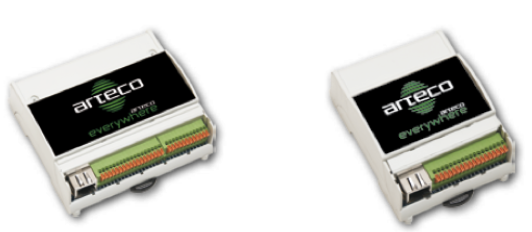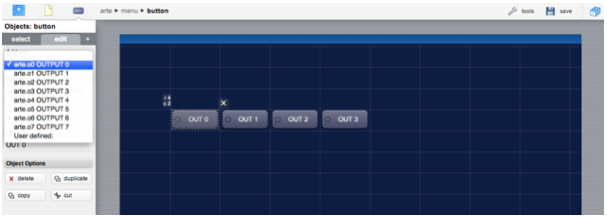Difference between revisions of "Arteco"
| Line 1: | Line 1: | ||
| − | [Arteco Everywhere] is a general purpose digital input-output Ethernet controller. | + | [http://www.arteco-global.com Arteco Everywhere] is a general purpose digital input-output Ethernet controller. |
It is available in two versions, a 4 inputs, 4 outputs module, and an 8 inputs 8 outputs module. | It is available in two versions, a 4 inputs, 4 outputs module, and an 8 inputs 8 outputs module. | ||
Revision as of 12:15, 12 February 2014
Arteco Everywhere is a general purpose digital input-output Ethernet controller.
It is available in two versions, a 4 inputs, 4 outputs module, and an 8 inputs 8 outputs module.
The ARTECOIO I/O Server in HSYCO creates a data point representation that you can use in the EVENTS language and Java to read the input pins and control the outputs. It also automatically allows you to create control objects for the Web user interface.
Contents
Arteco Configuration
The IP address must correspond to the IP address of the Arteco module (the default address is 192.168.10.96). The port number is optional and can be omitted if the module is configured to the 80 default HTTP port number.
The user and password parameters are also optional, and can be omitted if the module is configured with the default admin user and arteco password.
HSYCO Configuration
Options
| ID | Default | Values | Description |
|---|---|---|---|
| startupevents | false | true | generate IO events also during the driver’s start-up phase |
| false | start generating events only after HSYCO is aligned with the current status of the system | ||
| inputdiscovery | false | true | automatically creates the list of all inputs in the systemtopo.txt file. Should be enabled to allow the automatic update of (button) objects’ states |
| false | auto-detect for input devices is disabled | ||
| outputdiscovery | false | true | automatically creates the list of all outputs in the systemtopo.txt file. Should be enabled to allow the automatic update of (button) objects’ states |
| false | auto-detect for output devices is disabled | ||
| inputs | 8 | 0...8 | use input pins from 0 to 8 |
| outputs | 8 | 0...8 | use output pins from 0 to 8 |
Datapoints
The data points associated to the input pins are named “i0” to “i7”. The data points associated to the output pins are named “o0” to “o7”.
The I/O Server generates asynchronous events based on the status of the Arteco module’s input and output pins. The output data points can be written to control the output pins.
| ID | Value | R/W | Description |
|---|---|---|---|
| connection | online | R | connection established |
| offline | R | HSYCO can't connect to the panel | |
| i<n> | 0 | R | input <n> is low |
| 1 | R | input <n> is high | |
| o<n> | 0 | R | output <n> is low |
| W | set output <n> to off | ||
| 1 | R | output <n> is high | |
| W | set output N to on | ||
| flip | W | invert the status of output <n> | |
| blink | W | continuously blink output <n> | |
| pulse | W | set output <n> to on, then off after 1 sec. |
User Interface
When using the default settings of the Arteco I/O Server, all output pins are available in the Project Editor and can be easily associated to any control button of the Web interface.
You can also set the inputdiscovery option in order to associate control buttons to the module’s inputs: the control buttons will show the input status, and have no effect when pressed.
Release Notes
3.3.0
- initial release
HSYCO and Home Systems Consulting are registered trademarks of Home Systems Consulting SpA. Java and JavaScript are registered trademarks of Oracle and/or its affiliates. ARTECO is a registered trademark of Arteco Srl. Other products or company names can be trademarks or registered trademarks of other companies and are used for demonstrative purposes only, with no violation intent.

